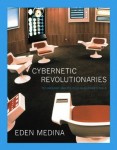 Always on the lookout for good books dealing with the history of computing, I was pleased to see this week the announcement of Eden Medina’s new book, Cybernetic Revolutionaries: Technology and Politics in Allende’s Chile (MIT Press, 2011). Not only does Eden happen to be a friend of mine, but her book is a welcome addition to the literature on the history of computing, which has generally been focused almost exclusively on the United States (with the occasional recognition of developments in Europe) and on technologies rather than users. Medina’s “cybernetic revolutionaries” are a very different group from the “computer boys” that I focus on (although they share similar characteristics and agendas). Medina’s subjects are the cyberneticians and government officials who imagined, in the context of Salvadore Allende’s socialist Chile, a far-seeing and -reaching computer system that would monitor and manage that nation’s entire economy. Although the system, called Project Cybersyn, was never fully implemented, it represents in many ways the apotheosis of a particular vision of the electronic computer as the ultimate cybernetic system.
Always on the lookout for good books dealing with the history of computing, I was pleased to see this week the announcement of Eden Medina’s new book, Cybernetic Revolutionaries: Technology and Politics in Allende’s Chile (MIT Press, 2011). Not only does Eden happen to be a friend of mine, but her book is a welcome addition to the literature on the history of computing, which has generally been focused almost exclusively on the United States (with the occasional recognition of developments in Europe) and on technologies rather than users. Medina’s “cybernetic revolutionaries” are a very different group from the “computer boys” that I focus on (although they share similar characteristics and agendas). Medina’s subjects are the cyberneticians and government officials who imagined, in the context of Salvadore Allende’s socialist Chile, a far-seeing and -reaching computer system that would monitor and manage that nation’s entire economy. Although the system, called Project Cybersyn, was never fully implemented, it represents in many ways the apotheosis of a particular vision of the electronic computer as the ultimate cybernetic system.
For those of you unfamiliar with the concept, cybernetics is possible the most important science that you have never heard of. The word itself has larger disappeared from public discourse (at least in the United States) but its influence remains strong in a range of scientific disciplines from ecology to molecular biology to economics to psychology.
To give just a small sense of what Cybernetic Revolutionaries is trying to accomplish, take a look at a recent post on the MIT Press blog in which Medina draws a parallel between the socialist utopian vision of Project Cybersyn and the roughly contemporary television series Star Trek. “Like ‘Star Trek,’ Medina argues, “Project Cybersyn brought together technology and politics to advance a utopian vision of a just society.” It is clear that, for many computer revolutionaries, “computerization” was not just a technological project, but also ideological. For many American corporations in the 1950s and 1960s, for example, computerization was about centralization. In Allende’s Chile, the ideological dimensions of computerization appear to have been much more complex. More recently, computerization is associated with democratization, or liberalization, or the perpetuation of free-market ideology. The clear and close relationship between technology and ideology is only beginning to be explored by historians.

 Follow
Follow